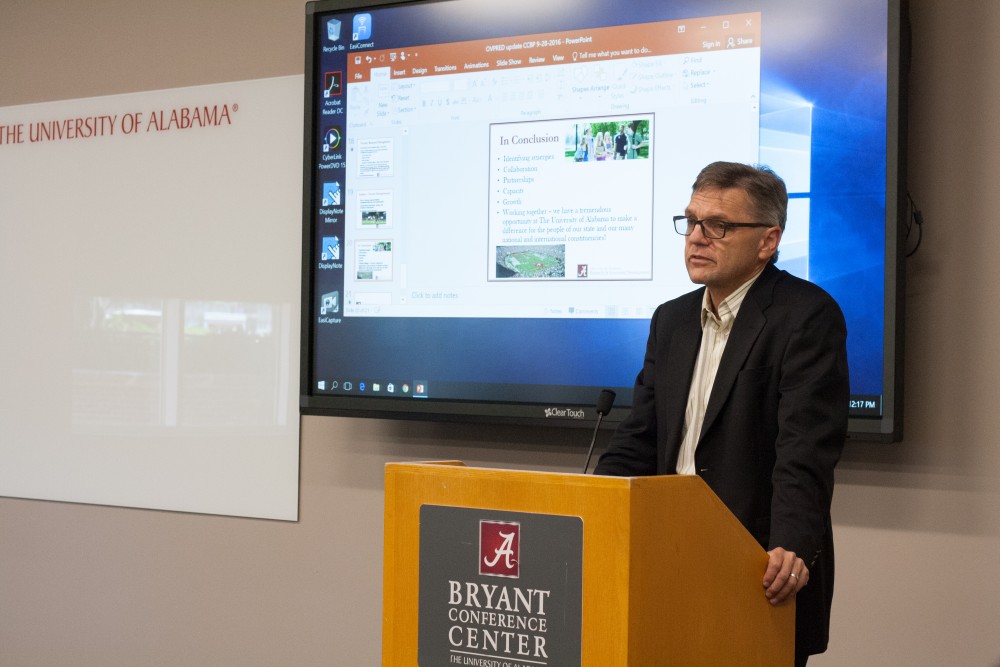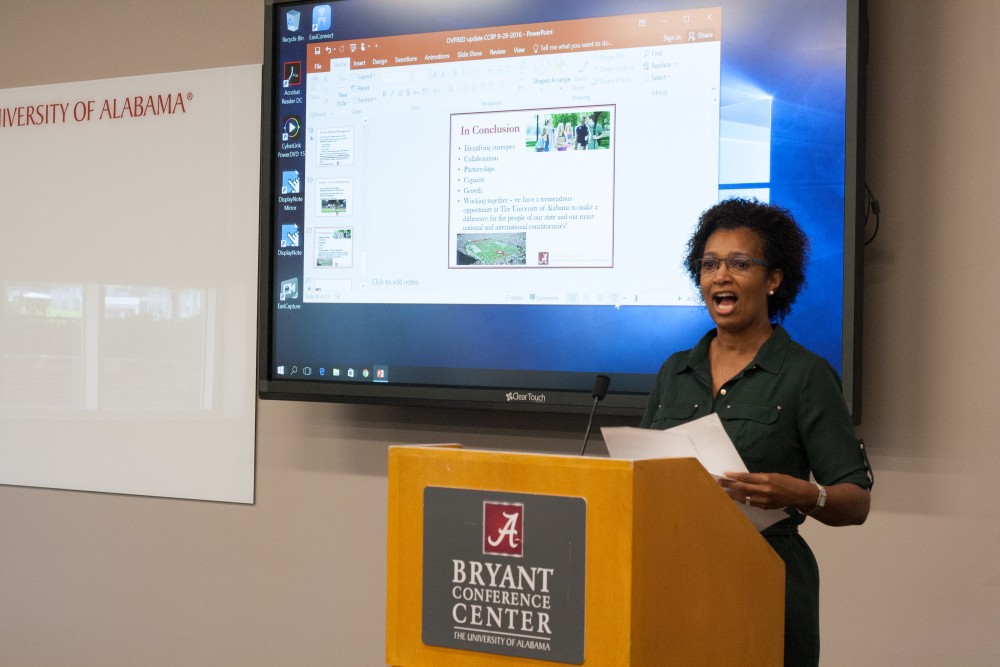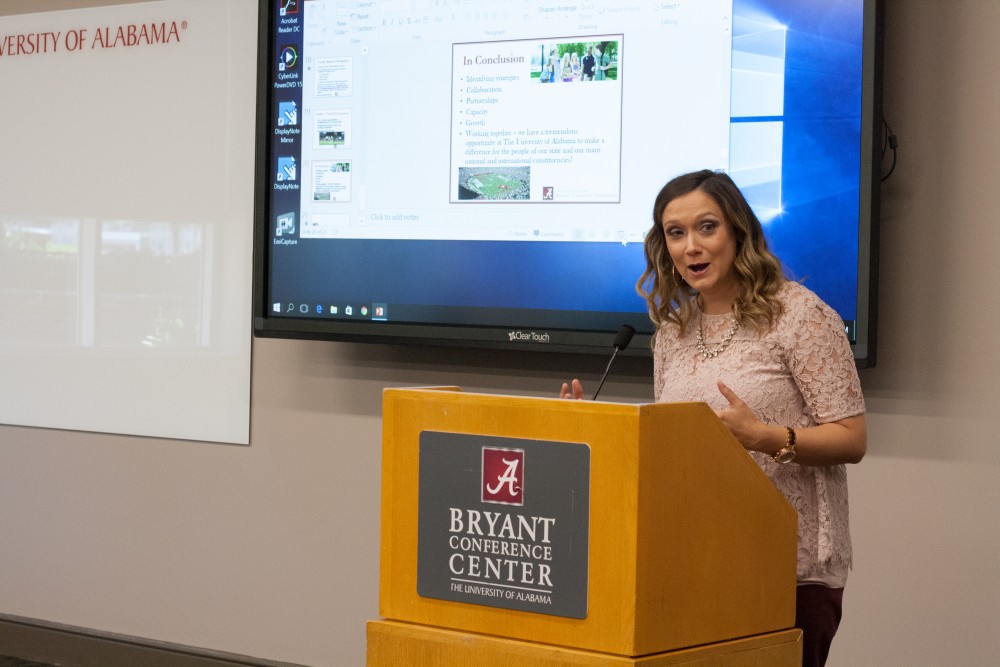Council on Community-Based Partnerships Holds First Meeting of Fall Semester; Next Meeting Will Be October 26
- October 19th, 2016
- in Council on Community-Based Partnerships
[envira-gallery id=”6553″]
TUSCALOOSA, Ala. — The Council on Community-Based Partnerships held its first luncheon meeting of the fall semester Wednesday, Sept. 28 in the Bryant Conference Center Rast Room on campus. The next Council of Community-Based Partnerships meeting is scheduled for Wednesday, Oct. 26, at 11:30 a.m., in the Birmingham/Central Room, Bryant Conference Center.
Dr. Samory Pruitt, vice president for Community Affairs, welcomed attendees and reported on the recently completed multi-day fall meeting of the Division of Community Affairs Board of Advisors, a group of active alumni who distinguished themselves as student leaders. One board member has endowed a scholarship designated for underrepresented students. Dr. Pruitt also spoke about the upcoming 17th Annual Engagement Scholarship Consortium (ESC) Conference, which will take place in Omaha, Nebraska, Oct. 11-12. As president of the executive committee of theESC board, Pruitt has begun drafting the ESC 2020 report, a three-year strategic plan addressing vision, focus and impact. The University of Alabama delegation for 2016 includes 31 faculty, staff, students and community partners, with seven members of the delegation making presentations.
Dr. Carl Pinkert, vice president for Research and Economic Development, presented an overview of the economic impact the University has on the state of Alabama. He also addressed the dramatic reversal of state funding vs. other funding for higher education throughout the past 40 years — noting the shift from the majority of funds coming from the state — and the need this shift has created to look for other opportunities to leverage resources at the state and federal levels, as well as through private partnerships working with industries and foundations.
Pinkert talked about the importance of developing a culture where research is perceived as important, as well as the necessity to share information that can help bring people from across campus together to work more collaboratively with shared equipment and resources. He informed the group that his office has created a separate strategic research plan that would feed into the campus-wide set of priorities outlined in the UA strategic plan.
His office is looking at spearheading several new institutes on campus, including water, energy and environment; transportation and the automotive industry; cyber and IT; and military demographics and sustainable civil infrastructure. He also discussed a life research institute that will cover cradle-to-grave research and indicated that a director search is under way. He encouraged those present to share information with their colleagues about upcoming workshops and networking opportunities that could help individuals from across campus form additional working partnerships. He also spoke of plans for a development center designed to help faculty members reach their goals of developing enhanced, competitive, high-quality external funding proposals. Pinkert concluded by discussing the importance of achieving greater visibility on campus by sharing accomplishments through appropriate media and contact with colleges, schools and departments.
 Dr. Peter Hlebowitsh, new chair of the Council’s Executive Committee, told the Council that community service and engaged scholarship are taken very seriously in the College of Education, where he serves as academic dean, and went on to note that the college is hiring a service-grant writer who will work with the school partnerships program and community-based service programs such as Crossing Points. He discussed efforts under way to shift the current 40/40/20 financial allocation for teaching/research/community service and outreach, acknowledging the need to recognize that some of these efforts overlap. He emphasized the desire in the college to utilize the Council to achieve goals in the area of outreach. He noted the importance of pooling resources for a common cause to better our communities, citizens and families, and for awakening social consciousness, particularly among new faculty members.
Dr. Peter Hlebowitsh, new chair of the Council’s Executive Committee, told the Council that community service and engaged scholarship are taken very seriously in the College of Education, where he serves as academic dean, and went on to note that the college is hiring a service-grant writer who will work with the school partnerships program and community-based service programs such as Crossing Points. He discussed efforts under way to shift the current 40/40/20 financial allocation for teaching/research/community service and outreach, acknowledging the need to recognize that some of these efforts overlap. He emphasized the desire in the college to utilize the Council to achieve goals in the area of outreach. He noted the importance of pooling resources for a common cause to better our communities, citizens and families, and for awakening social consciousness, particularly among new faculty members.

Executive committee updates followed.
Dr. Martha Crowther, professor of psychology, gave the report for the Faculty Teaching and Research Support Committee on behalf Dr. Rebecca Allen, professor in the Alabama Research Institute on Aging and the Department of Psychology. Crowther reported that there were 11 applicants during the last travel-funding cycle and that three of the applicants were selected. The committee hopes to receive more applications for the next funding cycle and is discussing ways to make more people aware of the availability of these applications and resources.
Crowther then gave the report for the Proposal and Seed Funding Support Committee. The deadline for applications for seed funding is Feb. 15, 2017, with the funding cycle beginning Dec. 1, 2017. The committee expects to notify recipients of funding by March 15, 2017. Awards of up to $5,000 are available. The committee plans to engage in interesting and creative ways to be certain that the campus community is aware of this funding source, which should increase the number of applicants.
Dr. George Daniels, assistant dean of the College of Communication and Information Sciences, followed with the Excellence in Community Engagement Recognition Committee report. He said that in the past, the committee has focused on the spring awards luncheon, but that they are looking at ways to spend time during the fall semester doing event planning and outreach improvement. He said that people are often doing community-engagement work but calling it something else. The committee plans to contact those individuals early — rather than waiting until the spring semester — to make them aware of upcoming seed-funding, travel grants, fellowship, awards and opportunities. Daniels also indicated that committee members plan to discuss innovative ways to increase participation in the annual CCBP Awards Luncheon, which is scheduled for Friday, April 14, 2017 (the Friday following Honors Week). His committee is looking into ways to help community partners better engage and to assist students in learning how to produce videos that showcase work supported by the Council.
Dr. Jen Nickelson, associate professor of health science, gave the report for the Academic Conference and Presentation Support Committee. The committee has added two new doctoral students: Eric Conrad and Dashauna Ballard. The travel award, which is open to students, community members, faculty and staff, is up to $1,000 for travel to a conference for training or presenting work on community engaged scholarship. Nickelson noted that this is a great way for individuals to showcase the work they are doing, as well as to receive training on how to do this type of work. The committee has decided to return to two funding cycles per year. The next deadline is February 15, 2017. The second cycle deadline will be September 15, 2017. The committee plans to contact applicants regarding a decision within one month of the application deadline.
Amanda Waller gave the report of the Community Partner Support Committee. She indicated that she has recruited several local nonprofit directors to work on a subcommittee that will help get the word out about community partnerships, including West Alabama AIDS Outreach and the West Alabama Food Bank. They have created a survey to get a feel for what keeps prospective community partners from partnership with UA. The survey will be distributed to local nonprofits in West Alabama, and they are also considering statewide distribution. Utilizing survey results, they will create a plan to share information on how to create community partners for UA. Waller also reported that Tuscaloosa’s One Place has formed a new partnership with UA that will look at the importance of physical education in school-aged students.

UA student Tera “CeeCee” Johnson reported for the Student Involvement and Support Committee. Members of the committee spoke at the recent Board of Advisors (BOA) panel on behalf of Scope and Global Café. Several BOA members have indicated interest in having them speak at further workshops. Additionally, Johnson announced that SCOPE has a new director, Dr. Tonyia Tidline, who serves as the director of Student and Community Engagement in the Center for Community-Based Partnerships. Johnson indicated that they have been able to recruit more student SCOPE members since Tidline’s arrival. She also shared that the International Student Association has shown interest in the work of the Global Café. CCBP held its first Global Café of the fall semester September 27. A panel spoke on international families. The event was well attended.
CCBP updates followed.
Dr. Jim McLean, executive director of the Center for Community-Based Partnerships, shared specific information about the grant program previously discussed by Pinkert. McLean indicated that three of the four days of grant workshops scheduled for the academic year have been held. The first three workshops focused on government grants, foundation grants and grants from corporations. One workshop — scheduled for Monday, Dec. 5 — remains. It will focus on the fundraising and sustainability aspects of grants.
The final coaching session will take place March 7, 2017. The hope is that all teams and individuals will have at least one proposal to share at that time. Ten UA community teams are engaged in this learning series, as are 12 individuals, for a total of 55 participants. There will be a celebratory dinner at the Hotel Capstone on March 7. Each team will have an opportunity to report at the dinner. Based on the success of this first round of workshops, a second round has been approved. David Bauer, the current coach, will return to campus to coach the second round of workshops.
McLean also reported that the Capital Hall facilities are now available at no charge to anyone on the University campus who wishes to use them. There is a conference room that will accommodate 8–10 people, as well as a training room that seats 30–40 depending on configuration. There is also a computer lab that houses 12 computers, with space for eight additional computers as the Center grows. The lab has a Wi-Fi connection specific to that room. Additionally, the CCBP is in the planning stages for the creation of an Engagement Resource Center. That facility will be available to faculty, staff, students and the community at large. Additionally, the CCBP has made arrangements with Parking Services to be able to issue their own visitor parking permits. Dr. McLean also announced the hiring of Dr. Tonyia Tidline.
Tidline introduced herself to the Council. She indicated that she will focus on the scholarship process of the SCOPE program, working with UA faculty and other students. She indicated a desire to reach out to communities to engage in programs and processes that will have impact and resonance in those communities. She sees her role as working with faculty and community on innovation, partnership, getting out of our own backyard and building relationships in the community.
Tidline said she seeks to build bridges and facilitate communication with the community. She announced that Dr. Pruitt would be speaking to SCOPE students about engaged scholarship at 6 p.m., Monday, Oct. 3, in Capital Hall, and encouraged those present to let the students in their areas know about this opportunity to hear directly from Dr. Pruitt about what Community Engaged Scholarship means and how they can be involved with the program. (Note: This meeting was held and attended by one of the largest number of students in SCOPE’s history.)
Dr. Pruitt introduced Diane Kennedy-Jackson as the Division of Community Affairs’ new publications coordinator. He also welcomed to the Council the dean of the Graduate School, Dr. Susan Carvalho.
The Council exists to connect faculty, staff, students and community partners in research-based projects designed to solve critical problems identified collaboratively by community members and the University. All academic disciplines are represented on a Council made up of campus and community members. The Council’s various committees oversee project funding, conduct an awards program, publish a research journal, propose methods to integrate teaching and research and seek outside funding, all with the goal of fulfilling the Division of Community Affairs’ motto: “Engaging Communities and Changing Lives.”
The Division of Community Affairs was created in 2004 and is recognized nationally and internationally for its leadership in community engagement. The division provided the leadership for the recent reaffirmation of the University’s Carnegie curricular and community engagement classification. The division also publishes the Journal of Community Engaged Scholarship, one of the leading refereed journals in the field.